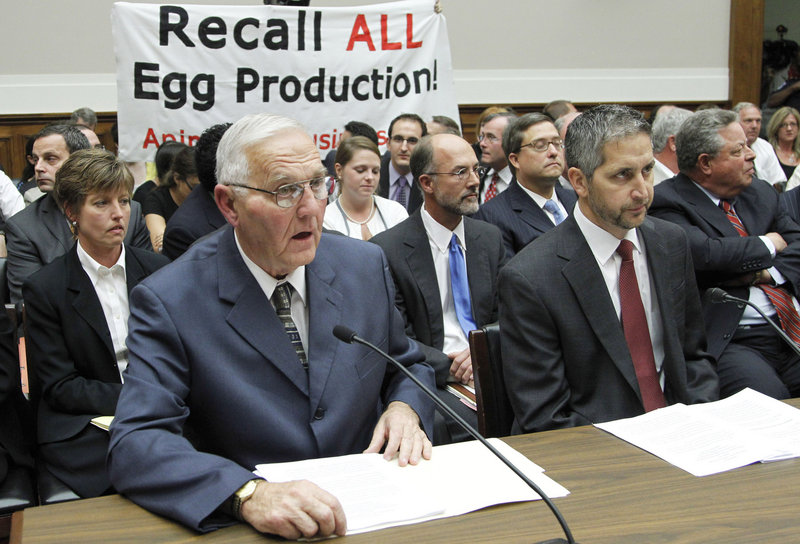IOWA CITY, Iowa — An Iowa State University scientist found evidence that sick hens at farms owned by Iowa egg producer Austin “Jack” DeCoster were “almost certainly” laying eggs contaminated with salmonella months before one of the nation’s largest outbreaks of food-borne illness came to light, newly released records show.
ISU’s Veterinary Diagnostics Laboratory found salmonella in manure at several Iowa egg-laying plants and in the internal organs of their birds, which were dying at unusually high rates, about four months before the August 2010 recall of 550 million eggs linked to the outbreak, records show.
The laboratory reported the results to the producer who had requested the tests, but scientists say they had no legal or ethical obligation to alert regulators or consumers.
The tests were recently made public in a civil lawsuit, while a federal grand jury looks into whether egg company executives misled the public by continuing to market products as safe despite potential knowledge that they were tainted.
DeCoster once owned DeCoster Egg Farms in Turner, Maine, which gained a reputation in the 1980s and 1990s as one of the nation’s most notorious workplaces.
DeCoster faced charges in 1989 that he hired illegal immigrants at his egg farms in Maine. DeCoster paid a fine to settle the charges.
In the salmonella case, lawyers for several egg company executives have denied their clients did anything criminal in the outbreak, which the Food and Drug Administration has estimated sickened up to 62,000 Americans.
Salmonella is the most common bacterial form of food poisoning, causing diarrhea, abdominal cramps and fever within days of eating a contaminated product. It can be life-threatening, although no deaths were reported in this outbreak.
Lab operations director Rodger Main said salmonella enteritidis, the strain discovered and later linked to the outbreak, doesn’t have to be reported to the state or federal government. He said doing so would have violated confidentiality agreements the lab signs with food producers, who pay for the voluntary testing and decide how to react after getting results.
“Our role is to provide a third-party, quality-assured diagnostic service, and it’s up to the client to interpret the information,” said Main, whose 125-employee lab receives $3.2 million in Iowa tax dollars and conducts about 1 million tests annually.
The laboratory released its testing records in response to a subpoena from NuCal Foods, a California cooperative that bought some of the tainted eggs. NuCal is suing DeCoster and his network of companies, which have been blamed for the outbreak, in federal court in California.
NuCal says it purchased millions of eggs that it later had to recall, faced lawsuits from customers who were sickened and lost profits as demand dropped after the outbreak.
DeCoster’s farms had asked the laboratory to test for salmonella at its Iowa egg plants as they prepared for federal rules to take effect in July 2010 that required mandatory testing for the bacteria at different stages of production. In January 2010, scientists collected samples from several plants. Testing the next month detected salmonella, and additional samples were collected.
By late April 2010, scientists had discovered that 43 percent of DeCoster’s poultry houses in Iowa were testing positive for salmonella, emails show. Around the same time, DeCoster’s managers started noticing a high mortality rate of chickens at some plants and sent dozens of carcasses for testing.
On May 1, 2010, ISU scientist Darrell Trampel told a colleague that the lab had isolated salmonella enteritidis, or SE, from the livers of hens that had died at two sites, which each housed tens of thousands of birds. “If SE is in the livers of the laying hens, it is almost certainly in the eggs at this site,” he wrote in an email, calling it “a very interesting finding.”
The same day, Trampel relayed those findings in two reports to Tony Wasmund, a DeCoster manager. He described how the 20 carcasses’ livers and spleens “were dark and swollen,” adding that salmonella was present.
Trampel told Wasmund in another report May 11 that dead chickens found in three plants were contaminated with salmonella, which was found “in all locations” of their internal organs. Trampel said the samples were being sent to the National Veterinary Services Laboratory in Ames for confirmation of salmonella, which came a month later.
It is not clear what DeCoster’s operations did after receiving the reports. Charles Hofacre, a University of Georgia scientist who was consulting on the companies’ safety program, sent a May 28 email to DeCoster executives proposing several steps to clean up the conditions, warning, “We have to get this level of SE knocked down!”
Hofacre did not return messages seeking comment, and a home phone listing for Wasmund rings unanswered. Both men have testified before the federal grand jury, court records show. Lawyers for DeCoster did not immediately return messages.
NuCal’s lawsuit argues that DeCoster and his companies “did not initiate egg tests or salmonella decontamination” or divert the eggs, and continued selling products they knew were tainted.
The lawsuit also says the defendants hid the filthy conditions at their farms so they could continue to profit.
Send questions/comments to the editors.



Comments are no longer available on this story